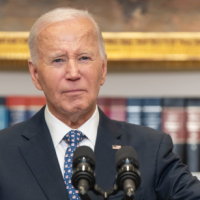Statistical indicators of President Biden’s four years in office.
Stories by D'Angelo Gore
Evidence Behind Comey Indictment Is Unclear
Trump Misleads on Climate Change and Renewables at U.N.
Viral Claims About Charlie Kirk’s Words
Since the fatal shooting of Charlie Kirk on Sept. 10, social media users have shared posts showing, quoting or paraphrasing remarks the posts attribute to the conservative activist. Many readers have asked us to provide the facts on whether Kirk, the founder of the youth political group Turning Point USA, made several of these comments.
Trump on EU and Japan Investments in the U.S.
Trump Repeats False Ukraine Aid Claim
Europe has allocated more money in direct, bilateral aid to Ukraine than the U.S. has during the war with Russia. But in President Donald Trump’s remarks surrounding recent meetings with the leaders of Russia and Ukraine, he falsely claimed that the U.S. has given Ukraine more than three times as much as Europe.
Recapping Trump’s Deceptive Tariff Claims
After months of delay, higher tariffs that President Donald Trump had vowed to impose on goods imported from dozens of countries went into effect on Aug. 7. Trump has made a series of false and misleading statements to justify his new tariff policies. Here is a recap of some of his claims that we have fact-checked.
Trump Offers No Evidence for Claim About Bill Clinton and Epstein Island
Trump’s Misleading Justification for Higher Tariffs on Imports of EU Goods
The United States and the European Union have reached a preliminary trade deal to avoid a 30% U.S. tariff on imported goods from the EU that President Donald Trump threatened would go into effect on Aug. 1. Trump had argued that higher tariffs were needed because EU tariffs and nontariff policies “cause the large and unsustainable trade deficits” between the U.S. and the EU, but economists disputed that statement.
Trump’s Hollow Surplus Claim
In recent speeches and media scrums, President Donald Trump has lauded the federal budget surplus for the month of June, claiming the surplus had not happened in “many, many years” or “decades.” To be clear, the U.S. had not recorded a surplus in June since 2016 – but the country has had several surpluses in other months since that time.









